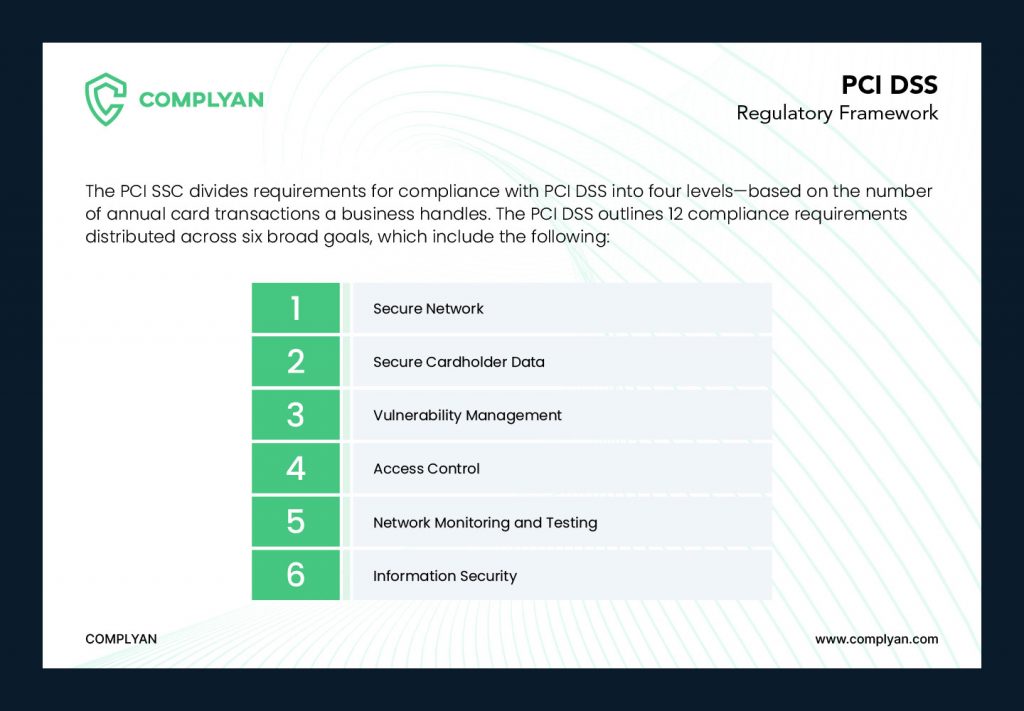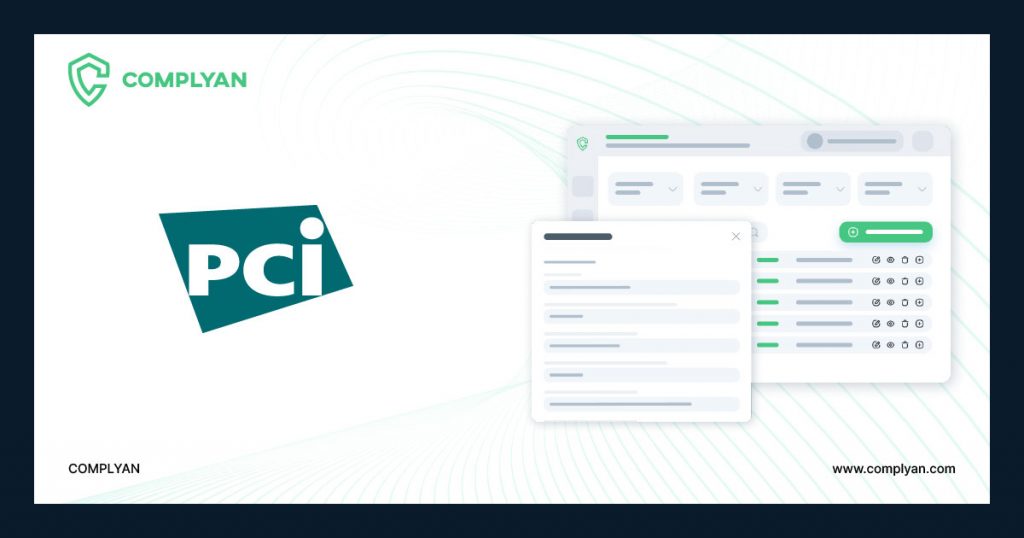How to Implement the PCI DSS using Complyan

In an increasingly digital world where online transactions have become the norm, the need for secure payment card transactions is more critical than ever before. One of the most prominent global initiatives for ensuring the security of card data is the Payment Card Industry Data Security Standard (PCI DSS). The PCI DSS is a comprehensive set of requirements that organizations must follow to protect against fraud and card data theft. Compliance with the PCI DSS is not only essential for safeguarding sensitive customer information but also for building trust and credibility with customers.
As the payment industry evolves, so do the threats against it. To keep up with the changing threat landscape, the Payment Card Industry Standards Council (PCI SSC) recently released version 4.0 of the PCI DSS. The latest version comes with significant updates and changes designed to strengthen the security practices for organizations and service providers that handle cardholder data. The new version also emphasizes the importance of continuous security processes, adds flexibility for different methodologies, and enhances validation methods.
As organizations work to comply with the latest version of the PCI DSS, they may find the process challenging and complex. That’s where compliance management platforms like Complyan come in. Complyan can help organizations implement and maintain the necessary security practices and requirements of the PCI DSS v4.0. In this blog, we’ll explore how Complyan can assist organizations in achieving PCI DSS compliance and why it’s a valuable tool for any organization looking to secure their payment card transactions.
Understanding The PCI DSS

Compliance Levels
PCI DSS compliance is not a one-size-fits-all approach. The Payment Card Industry Security Standards Council (PCI SSC) recognizes that different organizations handle different levels of card transactions and therefore divides the requirements for compliance into four levels.
Level 1 is for businesses that handle over six million credit or debit card transactions per year. They must undergo an internal audit by an authorized PCI auditor annually and submit a quarterly scan by an Approved Scanning Vendor (ASV) to the PCI governing body.
Level 2 is for organizations that handle between one and six million card transactions annually. They must complete a Self-Assessment Questionnaire (SAQ) annually and may also be required to submit a quarterly PCI scan.
Level 3 applies to merchants that process between 20,000 and one million e-commerce card transactions annually. They must complete a yearly assessment using the relevant SAQ and may be required to submit a quarterly PCI scan.
Level 4 is for merchants that process fewer than 20,000 e-commerce transactions annually or up to one million real-world transactions. They must complete a yearly assessment using the relevant SAQ and may also be required to submit a quarterly PCI scan.
It’s worth noting that the minimum security precautions an organization must take to comply with PCI DSS depend on its classification into one of these levels. Therefore, businesses need to understand which level of compliance they fall under to ensure they meet the appropriate security standards.
PCI DSS Requirements
The following are the 12 main requirements of PCI DSS version 4:
- Install and Maintain Network Security Controls: This requirement involves implementing and maintaining robust network security controls such as firewalls, intrusion detection and prevention systems, and secure remote access systems to protect cardholder data from unauthorized access.
- Apply and Secure Configurations to All System Components: This requirement involves ensuring that all system components, including hardware, software, and applications, are configured securely to reduce the risk of vulnerabilities that attackers could exploit.
- Protect Stored Account Data: This requirement involves protecting the storage of cardholder data, including implementing strong encryption and secure storage protocols to safeguard the information from unauthorized access.
- Protect Cardholder Data with Strong Cryptography During Transmission Over Open, Public Networks: This requirement involves protecting the transmission of cardholder data over open and public networks by implementing strong encryption and secure transmission protocols such as SSL and TLS.
- Protect All Systems and Networks from Malicious Software: This requirement involves implementing anti-virus and anti-malware solutions and keeping it up to date to protect against known and emerging threats.
- Develop and Maintain Secure Systems and Software: This requirement involves employing safe coding methods and developing and maintaining secure systems and software to lower the risk of vulnerabilities that attackers could exploit.
The 6 other requirements include the following:
- Restrict Access to System Components and Cardholder Data by Business ‘Need to Know”
- Identify User And Authenticate Access To System Components
- Restrict Physical Access to Cardholder Data
- Log and Monitor All Access to System Components and Cardholder Data
- Test Security of Systems and Networks Regularly
- Support Information Security with Organizational Policies and Programs
How Complyan Can Help Implement PCI DSS

Complyan’s compliance management platform is an all-in-one solution that simplifies the complex compliance management process. Its user-friendly interface and advanced features enable businesses to streamline their compliance efforts and easily achieve PCI DSS compliance. Complyan can help with PCI DSS compliance in the following ways:
- Automated policy management: One of the key features of Complyan’s platform is its automated policy management. It provides businesses with customizable policy templates that align with the PCI DSS requirements. The platform automatically updates these policies as new regulations are released, ensuring that businesses stay compliant.
- Continuous monitoring and risk assessment: Continuous monitoring and risk assessment are other vital aspects of the Complyan platform. It monitors systems and system configurations and networks continuously, identifies vulnerabilities, and generates reports in real-time. This feature enables businesses to stay on top of potential risks and take action before any data breaches occur.
- Task management and reporting: Task management and reporting are also essential components of Complyan’s platform. It allows businesses to assign tasks and deadlines to team members, track progress, and generate reports for auditors. These features ensure that businesses meet their compliance requirements and simplify the reporting process on compliance activities.
Other Complyan modules that can help with PCI DSS implementation include:
- Vulnerability Management
- Incident Management
- Third-Party Risk Management
Benefits of Using Complyan for PCI DSS Compliance
Complyan offers many security standard compliance benefits, including:
- Reduced Compliance Costs: Complyan streamlines and simplifies the compliance process, significantly reducing the cost of compliance with PCI DSS. It eliminates the need for manual compliance management, saving businesses time, money and other associated resources.
- Improved Efficiency: Complyan’s platform is designed to help businesses eliminate unnecessary friction and achieve compliance with Cybersecurity guidelines like the PCI DSS as quickly and efficiently as possible. The platform automates and manages compliance processes, making it easier for businesses to manage compliance requirements and stay updated with the latest regulations.
- Enhanced Security: Complyan’s continuous risk assessment and monitoring capabilities help businesses identify and address potential security risks in real time. This means businesses can proactively mitigate security threats, reducing the risk of data breaches and other security incidents.
- Better Decision-Making: Complyan provides businesses with real-time insights into their compliance status, which allows for informed decision-making. The platform also provides businesses with detailed reporting and analysis, enabling them to identify areas for improvement and make informed decisions to enhance compliance and security.
- Comprehensive Support: From policy development to risk assessment and ongoing monitoring, Complyan provides businesses with the tools, guidance, and support they need to achieve and maintain compliance with PCI DSS.
- Integration with Other Compliance Standards: Complyan’s platform is designed to integrate with other compliance standards, allowing businesses to manage compliance across multiple regulatory frameworks from a single platform. This makes compliance management more efficient, effective, and cost-effective.





 Governance and Policy Management
Governance and Policy Management